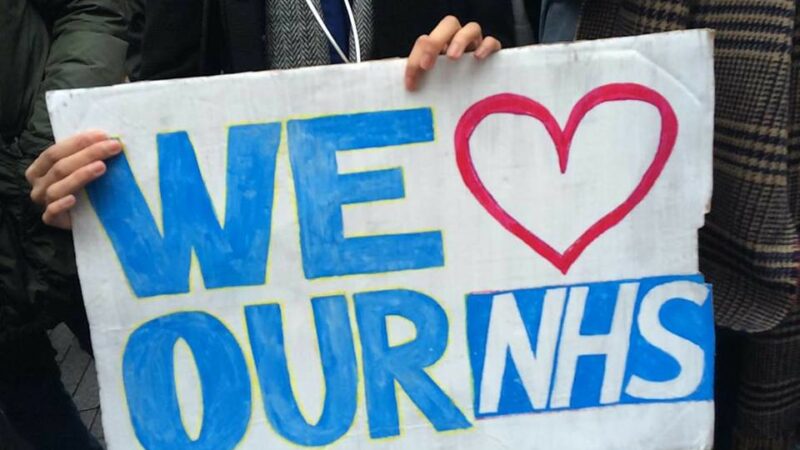The generations that witnessed the birth of the NHS now need its support, and a new, supportive system of social care.

Yesterday we celebrated the 72nd birthday of the NHS, protested at the damage inflicted by successive governments, and were inspired by a ‘2020 vision’ for better healthcare. Keep Our NHS Public with Health Campaigns Together called on supporters to organise several celebratory protests around the country. In this we were joined by We Own It’ and The People’s Assembly Against Austerity. The COVID-19 pandemic has highlighted the importance of not taking our NHS for granted, and the amazing commitment to public service of staff, from cleaners through to consultants.
Simultaneously, the long-term erosion of the NHS as a universal service through underfunding and fragmentation has been thrown into sharp relief. Private companies failing to deliver on Personal Protective Equipment (PPE), testing for coronavirus and contact tracing are just some of the examples of a failed ideology that wrongly insists ‘private is good, public is bad’, despite all evidence to the contrary.
Suddenly the importance of undervalued low paid staff has been recognised as they were transformed into ‘key workers’. The racism inherent in charging migrants for health care and visa surcharges also became clear for all to see in the light of the huge contribution made to health and social care by overseas workers, including many from Black, Asian and Ethnic Minority Communities.
At the start of the pandemic, the NHS was in a weakened state from austerity, cuts, staff shortages and a relentless drive by government to reconfigure and outsource services while diminishing scrutiny and accountability. That the NHS managed not to be overwhelmed by COVID-19 was testimony to the residual strengths of a national public service, and the huge efforts made by staff.
The government’s irrational belief in British exceptionalism and its mismanagement of the pandemic has resulted in the highest death rate of any European country and piled on exceptional pressure. While claiming credit for doing everything right, at the right time and according to scientific advice, the figure of 65,000 dead stands as mute witnesses to its culpability. Rather than ‘throwing a protective ring around care homes’, this sector was left to fend for itself having first been seeded with infected patients hastily discharged from hospital. With over 16,000 residents dead, care home staff and those delivering home care service, often lacking in PPE, also suffered notably high death rates.
At the same time, outpatient clinics and elective surgery were brought to a halt and patients were encouraged to avoid their GPs and A&E departments. This wreaked immense damage on those with both chronic and acute conditions, and a record pre-pandemic waiting list has now more than doubled to almost 10 million. If the NHS has been ‘protected’, it has been at enormous cost. Johnson’s glib promises of a ‘new deal’ including £1.5bn for hospital maintenance ring horribly hollow when the National Audit Office has already identified a £6bn maintenance backlog as a consequence of austerity politics.
In 1948, Minister of Health Aneurin Bevan’s great vision of universal health care, free at the point of use was realised despite having to be built from the ashes of war. It is worth recalling some of his words:
“A free Health Service is a triumphant example of the superiority of collective action and public initiative applied to a segment of society where commercial principles are seen at their worst.”
He also recognised that there were those who were bitterly opposed to a publicly funded and delivered service and was sensitive to their tactics:
“They knew the Service was already popular with the people. If the Service could be killed they wouldn’t mind, but they would wish it done more stealthily and in such a fashion that they would not appear to have the responsibility.”
These days, ‘they’ include some senior managers, technocrats, business leaders and politicians who march together under the banners of ‘long needed reform’ and ‘essential modernisation’.
Bevan nationalised the charitable hospitals and brought them into a single system where there was collaboration and sharing of expertise with enormous benefits for training and research that then enhanced patient care. Contrast this with the present government throwing money at the private hospital sector in secret deals, exempting them from the pressures felt by all other businesses, and accepting relatively little in return.
The generations that witnessed the birth of the NHS now need its support, and a new, supportive system of social care. It is for a new generation to seize the baton and fight to protect and restore the NHS’s founding values. Our vision is to rebuild a new NHS, capable of dealing not only with the long-term costs and pressures of COVID-19 but also restored to peak performance levels of service delivery in a society where the health of the people is the first concern of government.
Dr John Puntis, Co-Chair of Keep Our NHS Public and Paediatrician
Left Foot Forward doesn't have the backing of big business or billionaires. We rely on the kind and generous support of ordinary people like you.
You can support hard-hitting journalism that holds the right to account, provides a forum for debate among progressives, and covers the stories the rest of the media ignore. Donate today.



